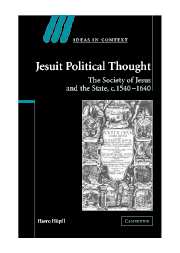Book contents
- Front Matter
- Contents
- Acknowledgements
- List of abbreviations
- Translations, references, and orthography
- Introduction
- 1 The character of the Society of Jesus
- 2 The Society's organisational ideas
- 3 The Society and political matters
- 4 The Church, the Society, and heresy
- 5 The confrontation with reason of state
- 6 Reason of state and religious uniformity
- 7 Jesuit reason of state and fides
- 8 Reason of state, prudence, and the academic curriculum
- 9 The theory of political authority
- 10 Limited government, compacts, and states of nature
- 11 The theory of law
- 12 The common good and individual rights
- 13 Tyrannicide, the Oath of Allegiance controversy, and the assassination of Henri IV
- 14 The papal potestas indirecta
- Conclusion
- Bibliography
- Index
- IDEAS IN CONTEXT
10 - Limited government, compacts, and states of nature
Published online by Cambridge University Press: 22 September 2009
- Front Matter
- Contents
- Acknowledgements
- List of abbreviations
- Translations, references, and orthography
- Introduction
- 1 The character of the Society of Jesus
- 2 The Society's organisational ideas
- 3 The Society and political matters
- 4 The Church, the Society, and heresy
- 5 The confrontation with reason of state
- 6 Reason of state and religious uniformity
- 7 Jesuit reason of state and fides
- 8 Reason of state, prudence, and the academic curriculum
- 9 The theory of political authority
- 10 Limited government, compacts, and states of nature
- 11 The theory of law
- 12 The common good and individual rights
- 13 Tyrannicide, the Oath of Allegiance controversy, and the assassination of Henri IV
- 14 The papal potestas indirecta
- Conclusion
- Bibliography
- Index
- IDEAS IN CONTEXT
Summary
THE ‘MEDIATE’ DERIVATION OF PRINCIPATUS
The account we have been considering explained and legitimated political authority as such. But it did not explain how any specific regime, government, dynasty, or prince can acquire legitimate authority. It was axiomatic to the Society and its enemies that legitimate authority ultimately comes from God. The issue between them was how it descends from this transcendent source to mundane office-holders, and whether, and if so how, the limits which legitimate political authority must respect might be enforced.
It was common polemical practice among its enemies to impute to the Society three doctrines which, they claimed, undermined secular authority: the ‘mediate’ derivation of political authority via ‘the people’, tyrannicide, and the potestas indirecta of the papacy. The first of these bore on the legitimation of specific regimes, the second and third (which will be considered in subsequent chapters) on possible ways of enforcing limits on regimes and rulers that exceeded their authority, or had none to begin with. In the fevered imagination of some anti-Jesuits, these doctrines formed part of a deep Jesuit strategy of furthering the cause of papal hegemony, Spanish policy, or (in even more conspiratorial vein) the Jesuit project of world domination, or any combination of these objectives.
- Type
- Chapter
- Information
- Jesuit Political ThoughtThe Society of Jesus and the State, c.1540–1630, pp. 224 - 262Publisher: Cambridge University PressPrint publication year: 2004



